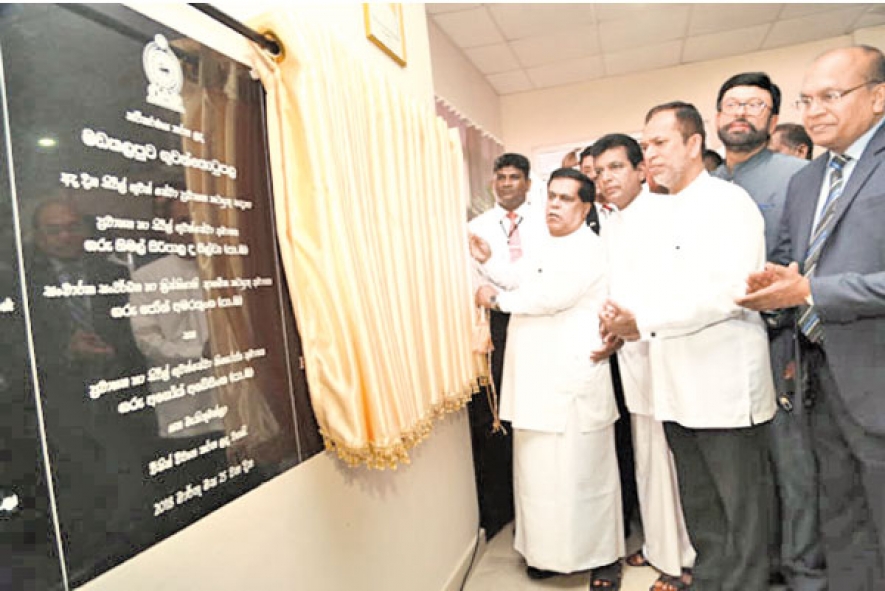Minister of Transport and Civil Aviation, Nimal Siripala De Silva who flew in the inaugural scheduled flight with Deputy Minister Ashok Abeysinghe for the opening said that the airport would be a major boost to promote tourism in the area.In addition we will start building an aviation school before the end of the year,” he said.
“Batticaloa airport air strip re-laid with a BITUMEN layer would function between sunrise to sunset daily as a civil airport which allows aircraft operations under visual meteorological conditions under the control and supervision of the Airports and Aviation Services (Pvt) Ltd.” Sri Lanka Air Force will not get involved in the operation of the airport other than handing its own flights. The Government encourages establishment of flying schools and related industries centering the airport aiming at resurrection and up keeping of social life and conditions of living in the area.
The Government has understood the need of having scheduled air services between domestic airports for sustained promotion of internal air transport and in this context any airline which commences scheduled flights to Batticaloa airport would be given free landing and parking for a period three months from date of opening of the airport for civil use.
Air Traffic Control at the Batticaloa airport would be provided by trained and licensed personnel to provide Air Traffic Control services in accordance with the international standards. Commercial aircraft are allowed to perform self-handing with a view to enhancing the efficiency and bringing down the cost of air travel.
Batticaloa Airport was first opened 60 years ago in November 1958 and was administered by Department of Civil Aviation initially. Army Engineers of the Sri Lanka Army had helped to make the airport operable and it was open to all members of the public.About 10 years later of its opening, the internal scheduled flights of Air Ceylon, which had been operated between the Ratmalana and Jaffna airports, were extended to cover Batticaloa airport as well.Air Ceylon used to operate daily flights to Batticaloa via Gal Oya (Ampara) using Nord (French made) aircraft which had 29 seats. The flight between Ratmalana and Batticaloa took only 75 minutes and was in great demand.
However, with the close of Air Ceylon on August 31, 1979, the operation of internal scheduled flights were ceased. On 27 March 1983 an air force took over the operational control of the airport and established an air base at the site.
With a proposal for expansion of the airport in around 1997, about 300 families living close to the airport, were shifted and given alternate land.With Sri Lanka’s commemoration of 100 years in aviation in 2012 and the Government’s plan to develop internal air travel, a project was launched on September 3, 2012 for the renovation of Batticaloa airport.The objective of development of the airport was also to help promote influx of tourists into the region by providing safer and expeditious travel instead of letting those spending long hours on roads.
The commencement of the project planned for an extension and overlay to the existing runway, fixing of runway lights and construction of a new terminal building as well as the apron; the area where aircraft are parked. As the Batticaloa runway is locked at either ends between the lagoon, it could not be extended beyond 1,560 meters, which is adequate for operation of 60 seater aircraft. Runway expansion work was done initially by the Road Development Authority (60%) and the balance part was completed by Sri Lanka Air Force.The airport after renovation was declared open by President Maithripala Sirisena on July 10, 2016. However, formal opening of the airport of civil operations were deferred as the airport had to conform to some of civil aviation requirements, which have now been fulfilled.The airport has a total land space of 145.2 hectares and the portion there of amounting to 75.9 hectares has been retained by Sri Lanka Air Force (SLAF) for continued operation of its air base.
Civil Aviation Authority of Sri Lanka has issued an Aerodrome Licenses to Airport and Aviation Services Ltd in accordance with the Air Navigation Regulations of 1955 to operate the airport as a civil airport after ascertaining their compliance with the applicable international standards.



















